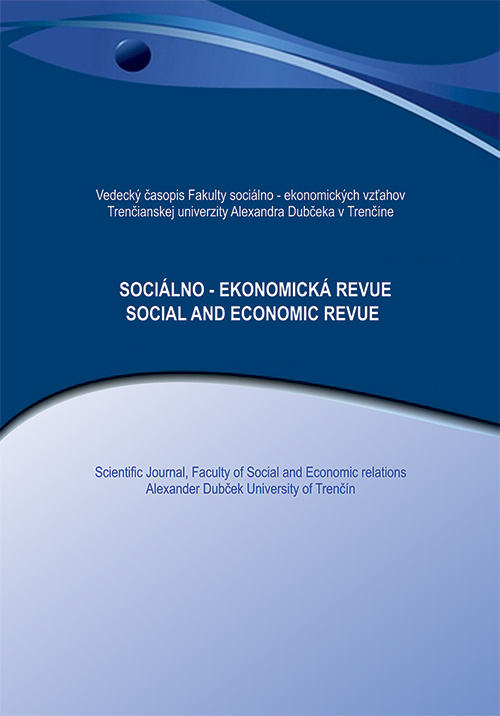CHALLENGES FOR FINANCE REGULATOR
Finance regulators are very important institutions for normal economic development of the country and good international cooperation in great extent depend from efficient work of finance regulator. Finance regulator has to be properly financed and this is also e very important aspect which is analysed also by academic researchers. Aim of current research paper is to investigate possible developments of finance regulator financing based on analysis of current legislative documents and expert views on possible future developments of finance regulator financing. Research methods applied: analysis of scientific publications and previous conducted research, analysis of legislative documents on finance regulator financing, expert survey. Data of expert survey are analysed by indicators of descriptive statistics. The results of the expert survey has indicated that there have to be prepared regulations for better motivation of market participants from one side and acceptable financing of finance regulatir from other side.
Vydanie: 2020/2 Strany: 60-68 Klasifikácia JEL: G18; G28
DOI:
Kľúčové slová: finance regulator, financing of finance regulator
Sekcia:
Kontakty:
Rita Vanaga, Mg. math., Mg. oec., Mg. admin.
Doctoral student of University of Latvia
Aspazijas bulv. 5, Riga, Latvia, LV – 1050
E – mail: ritava@inbox.lv
Biruta Sloka, Dr. oec. Professor
University of Latvia
Aspazijas bulv. 5, Riga, Latvia, LV – 1050
E – mail: Biruta.Sloka@lu.lv
Literatúra:
Amalina Wan Abdullah, W., Percy, M., Stewart, J. (2013), Shari'ah disclosures in Malaysian and Indonesian Islamic banks: The Shari'ah governance system, Journal of Islamic Accounting and Business Research, 4(2), 100-131.
Becker, B., Derbes, E.K., Bruemmer, R.J., Harris Gutierrez, F.,Lybecker, M.E. (2008), Treasury department's proposed overhaul of the financial regulatory structure: a look at the blueprint and a look ahead, Journal of Investment Compliance, 9(3), 29-40.
Bértoa, F.C., Molenaar, F., Piccio, D.F., Rashkova, J.R. (2014). The world upside down: Delegitimising political finance regulation. International Political Science Review, 35(3), 355-375.
Bovens, M., Schillemans,T., Goodin. R.E. (2014). Public Accountability. In The Oxford Handbook of Public Accountability, edited by M. Bovens, R. E. Goodin, and T. Schillemans, 1–20. Oxford: Oxford University Press.
Christensen, T., Lægreid. P. (2011). The Ashgate Research Companion to New Public Management. Farnham: Ashgate.
Cooper, R., Seddon, J., Van Vliet, B. (2017). High-Frequency Trading and Conflict in the Financial Markets, Journal of Information Technology, 32(3), 270-282.
Cooray, A. (2011). The Role of the Government in Fnancial Sector Development. Economic Modelling, 28(3), 928-938.
De Koker, L. (2009). Identifying and Managing Low Money Laundering Risk: Perspectives on FATF's Risk‐Based Guidance, Journal of Financial Crime, 16(4), 334-352.
Fallon, I. (2015). Black Horse Ride: The inside Story of Lloyds and the Banking Crisis, Robson Press, London.
FKTK (2014). Vienotais uzraudzības mehānisms (Joint Banking Supervision Mechanism). [on-line] [acc. 2020-03-04] Retrieved from https://www.fktk.lv/mediju-telpa/nozares-temati/vienotais-uzraudzibas-mehanisms/kas-jazina-par-vienoto-uzraudzibas-mehanismu/.
FKTK (2019). Banku sektora transformācija (Transfornamation of Banking Sector). [acc. 2020-28-04] Retrieved from https://www.fktk.lv/wp-content/uploads/2019/11/INFOGRAFIKA_Q3_2019_LV.pdf. [Acessed 28.04.2020]
Haslam, J. (2010). The Problematics of Fnancialization: Critical Reflections. Critical Perspectives on Accounting, 21(7), 642-645.
Hazli, Z.R., Ghafar, I.A. (2008), Does Islamic banks' securitization involvement restrain their financing activity?, Humanomics, 24(2), 95-109.
Holland, J. (2019). Bank Top Management Teams, Disclosure, Learning, Survival and Failure – 1990-2017, Qualitative Research in Financial Markets, 11(1), 31-59.
Holland, J. (2009). Looking Behind the Veil’–invisible Corporate Intangibles, Stories, Structureand the Contextual Information Content of Disclosure. Qualitative Research in Financial Markets, 1(3), 152-187.
Liff, R., Wahlström, G. (2018). Failed Crisis Communication: the Northern Rock Bank Case, Accounting, Auditing & Accountability Journal, 31(1), 237-260.
Murphy, D. (2006). Disclosure and Sharing of Sensitive Information: Revisiting Risk in Co‐operating Regulatory Regimes, Journal of Financial Crime, 13(4), 420-441.
Novoa, A., Seelig, S.S. (2009). Governance Practices at Financial Regulatory and Supervisory Agencies, IMF.
Palepu, K.G., Healy, P.M., Bernard, V.L., Wright, S., Bradbury, M., Lee, P. (2008). The Role of Capital Market Intermediaries in the Dot-com Crash of 2000. In Business Analysis and Valuation: Using Financial Statements, 4th ed.,CengageLearning,Boston, MA, pp. 11-19.
Preda, A. (2005). Legitimacy and Status Groups in Fnancial Markets. The British Journal of Sociology, 56(3), 451-471.
Qiao, K. (2013). Government Policies and Corporate Fnancing Decisions in China: Theory and Evidence. Journal of Systems Science and Systems Engineering, 22(1), 93-111.
Saeima (Parliament of Republic of Latvia). (2000). Law on the Financial and Capital Market Commission, accepted 01.06.2000.
Schillemans, T. (2016). Calibrating Public Sector Accountability: Translating Experimental Findings to Public Sector Accountability. Public Management Review, 18, 1400-1420.
Santangelo, B., Jacobs, M.A. (2005), Ask not for whom the bell tolls, it may toll for you next: intensified anti‐money‐laundering enforcement transforms the regulatory landscape, Journal of Investment Compliance, 6(1), 4-15.
Sathye, M., Patel, C. (2007), Developing financial intelligence: an assessment of the FIUs in Australia and India, Journal of Money Laundering Control, 10(4), 391-405.
Witko, C. (2005). Measuring the Stringency of State Campaign Finance Regulation. State Politics & Policy Quarterly, 5(3), 295-310.
Wymeersch, E. (2007). The Structure of Financial Supervision in Europe: About Single Financial Supervisors, Twin Peaks and Multiple Financial Supervisors. European Business Organization Law Review, 8(2), 237-306.
Zekos, G. (2003). MNEs, Globalisation and Digital Economy: Legal and Economic Aspects. Managerial Law, 45(1/2), 1-296.


